Paul Gallen on peptides: ‘I don't know if I was duped or doped’
It was the alleged doping scandal that rocked the NRL and the Cronulla Sharks. Former captain opens up for the first time of the day he was first introduced to peptides. EXCLUSIVE BOOK EXTRACT
NSW
Don't miss out on the headlines from NSW. Followed categories will be added to My News.
Paul Gallen spent 19 seasons in the NRL spotlight, mostly with his guard up.
Now the former NSW State of Origin and Cronulla Sharks captain says he’s looking forward to lifting the lid on a career that included incredible highs and shocking lows.
“This is my say on everything,’’ Gallen said of the release of his autobiography, Heart and Soul.
“This is the only platform during my entire career that I’ve been willing to go as far as I have, to give people a real look into my life and everything that has made me who I am.
“I think most people who have followed my footy career know that with me, they’re not going to get a book full of cliches — I’ve been honest and waited for this opportunity to tell plenty of stories that have never been told before.’’
HERE IS AN EXCLUSIVE EXTRACT FROM HEART AND SOUL
I didn’t want to include the most difficult period of my life in this book.
With only the last few chapters to be written, I wanted to walk away from the entire project.
I just didn't want anything to do with that time of my life or the sickening emotions attached to it.
By reliving it, I felt like I was digging up the past and picking at an old wound, when in reality I have moved on, eager to strive towards a better future.
Still to this day, I've found it too difficult to discuss certain elements of the most gut-wrenching period of my career.
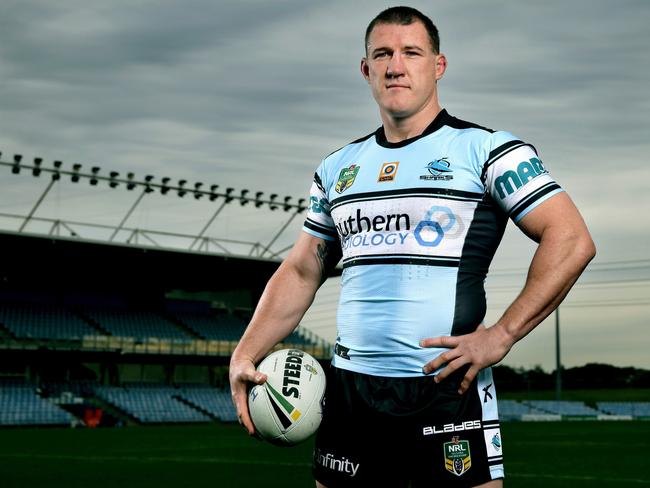
The mere mention of the 2013 supplements scandal makes my stomach churn.
There are personally challenging days that occurred at the time and in the wake of the eventual ASADA (Australian Sports Anti-Doping Authority) ban that I haven't shared with even my own family.
I have worked hard on tempering my emotions ever since those incredibly dark days. But I will never completely forget the torment, and I never want to experience the indescribable feelings of uncertainty, distrust, emptiness and anguish ever again.
I wasn't the only person dragged through this mess, but, without question, I was the most high-profile rugby league player.
And with that profile came challenges of the toughest kind — and also the greatest
of consequences. I unwillingly was, because of my high profile, forced to confront a greater level of responsibility. Indeed, had I known — way back when I signed my first contract with Cronulla as a teenager — of the mental and physical anguish that would begin in 2011 and culminate in 2014 with our ASADA ban, I doubt I would have ever committed to chasing an NRL career.
The pain would not have been worth the pursuit.
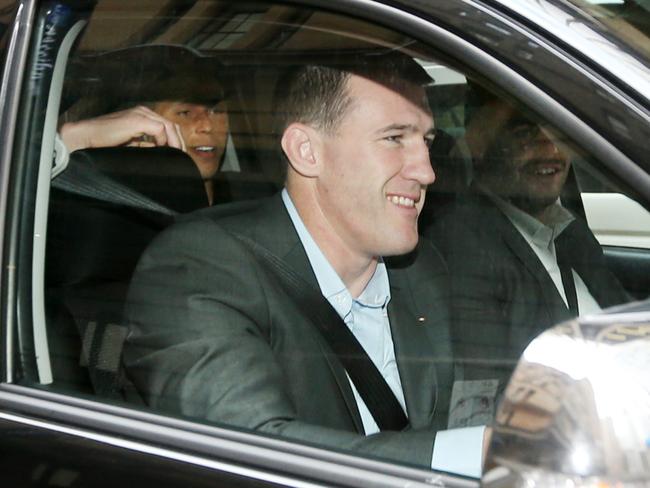
I have come a long way since 2011. But I will never overcome the mental and emotional torment I endured during the eighteen-month period of the ASADA investigation and its consequences.
Sixteen members of the Cronulla Sharks playing group were breached by ASADA after they determined — according to their official records — that we “may have used a prohibited substance between around March and April 2011”.
I don't know if I was duped or doped — I probably never will.
But what I do know is a four-week period where supplements were introduced, supplied and administered by my club changed my life and those of my teammates forever. That's something I have also come to terms with.
The overriding motivation in sharing this chapter with you is to tell my story.
Even my harshest critics will concede that I am not one to shy away from putting forward my side of the story. Second, I want to help you understand my actions, the actions of others and how, without a shadow of doubt, I took every possible step — as I had always been professionally advised — to ensure my career could never be tainted like it was.
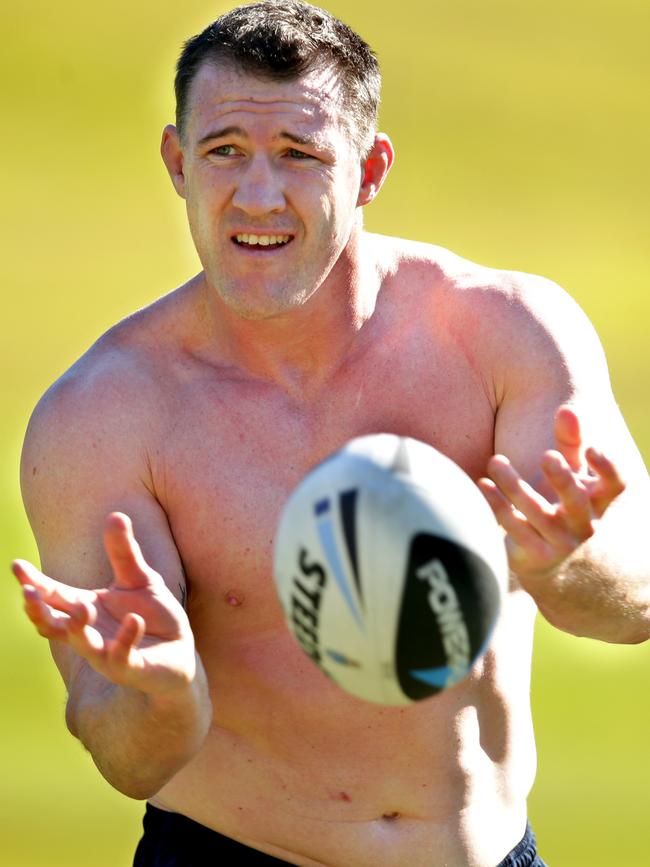

The first time I heard the word peptide was in 2011. It was on a Sunday morning, 20 March, the day before our Round 2 match of the 2011 NRL season against our arch rivals, St George Illawarra. I had played for the Sharks in our Round 1 season opener against the Canberra Raiders, finishing with a disappointing loss and a strained calf muscle.
The calf injury was still nagging several days later. As a result, the tightness in my calf was just enough to limit my preparation leading into our clash with the Dragons. To minimise the chance of aggravating the injury further, I sat on the sideline of Shark Park and watched my teammates complete the final training session ahead of our match with the Saints.
Out on the field, the first-grade squad completed the short, sharp session with a light stretch before returning to the dressing rooms.
Or so I thought.
Alone, I made my way back into the Shark Park locker room. Something wasn't right. The entire place was virtually empty.
I didn't think too much about it, other than the rest of the boys must have been having a chat out on the field, as they warmed down.
I took a seat under my locker and waited a few minutes before thinking, “Where is everyone?”. Only a handful of players had wandered through the locker room.
The scene was nothing like the typically boisterous vibe of a footy team's locker room the day before an important match with one of their greatest rivals.
“Where is everyone?” I asked one of the few teammates who had found his way back to his locker.
“Upstairs, getting that supplement,” he said.
“Right,” I said, pretending that I knew exactly what he meant.
The reality is, I had no idea what he was referring to.
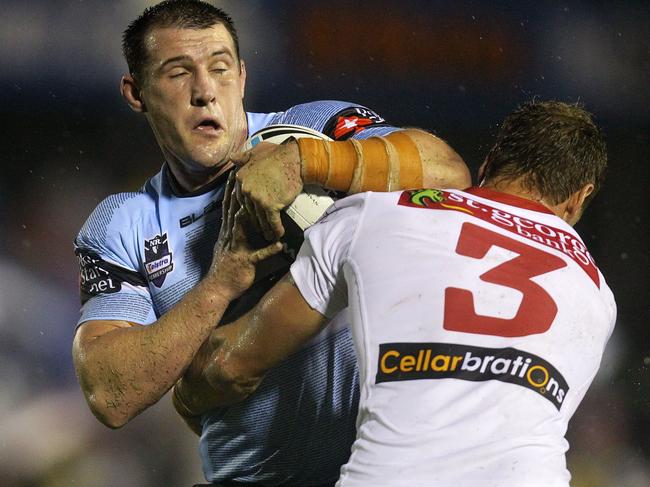
I decided to take a walk upstairs to find out. I climbed the stairs that travel up inside the Andrew Ettingshausen grandstand at Shark Park, before finding a few players inside a room that the club used outside of game day for rehabilitation and physiotherapy. Our head trainer at the time, Trent Elkin, was in the room chatting with a few of the boys. “Hey boys, what’s going on?” I said, announcing myself.
Trent explained that, because the calf injury had forced me to miss our regular training sessions during the previous few days, I had also been absent from a meeting that had been organised to explain that the team would be undergoing a new supplement regime.
My absence from these meetings has since been documented and proven as fact.
“What are the supplements?” I asked.
Trent explained to me that the supplements were amino acids and vitamins.
He added that Stephen Dank would be able to help me better understand what the supplements were.
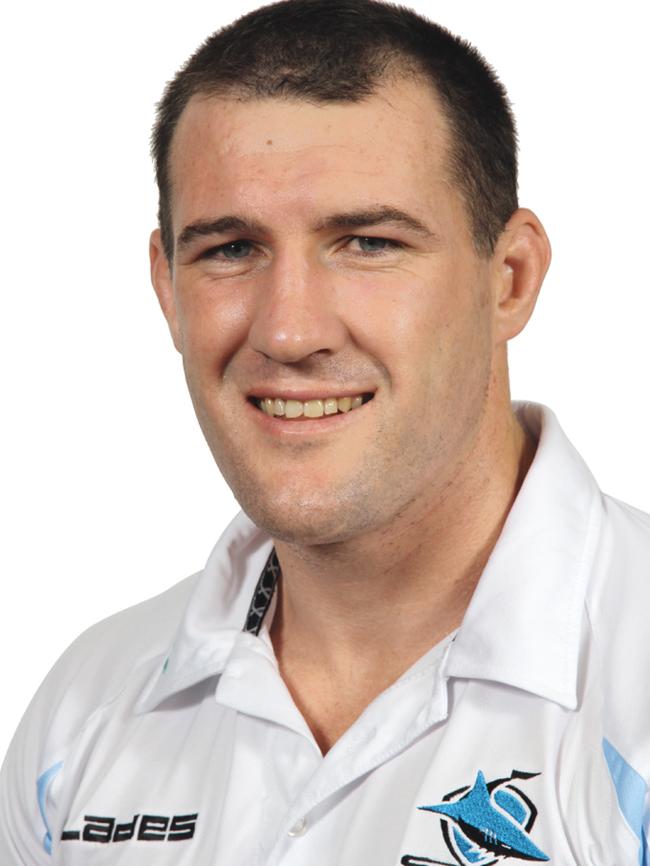
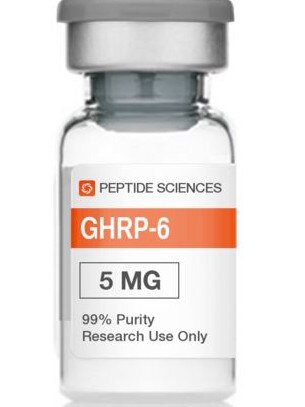
Dank had been invited to work at the club in a bid to assist our level of physical performance ahead of the 2011 season. In the wake of the supplements scandal, many believe that Dank's role at the Sharks was only ever associated with the controversial supplements program.
That's not entirely true. Dank also introduced an increased level of sports science technology that the cash-strapped Sharks had never been able to afford before. In 2011, the Sharks were on the breadline; the club was financially stricken, and there were stories that it would be relocated or dissolved.
So, at the time, the arrival of Dank — who had worked at Manly from 2006 to 2010, where he played an integral role in making the club a leader in sports science — was considered a coup for the Sharks.
One addition to our training that Dank made was the introduction of GPS for the first time at the club. It monitored and assessed the training load of every player.
This piece of technology immediately brought us up to speed with the fifteen other NRL clubs that already had the system in operation.
Dank also devised a player-specific training schedule that was individualised so that players from different positions — for example, forwards and backs — were no longer training with a “one size fits all” mentality.
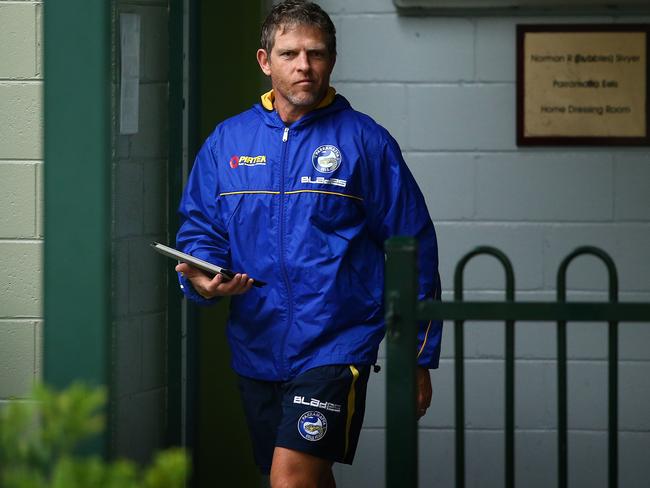
At that time, Dank also overhauled the way the club handled a player's rehabilitation from injury. The implementation of oxygen masks for injured players in a bid to increase the flow of oxygen around the body and hasten their recovery was an example of the level of sports science he delivered to the Sharks.
I followed Trent along a corridor, inside the Andrew Ettingshausen grandstand and behind the game-day corporate suites, to a separate room where Dank was sitting.
Trent asked Dank to explain to me what amino acids and vitamins were. Dank said they were a form of peptide.
"What's that?" I replied.
Dank said a peptide was a group of amino acids joined together.
I then asked what the peptide is called. Dank replied, “GHRP6 — it's a type of secretagogue.” If you're reading this and have no clue what a secretagogue is, don't worry — neither did I.
Seeing that I was confused, he added, “Let me explain it a little better.”
He turned around to face a whiteboard and began writing, while explaining the intricate workings of an amino acid by drawing circles, numbers and lines. As you would expect, some of the information being put forward was sinking in, but a large majority of it flew well over my head. But, without any doubt, I realised the importance of what was being proposed.
I continued to pose questions to Dank and Trent, attempting to be certain about what was being explained. I finished the conversation by saying, “I want to check the ASADA website first.”
Dank nodded his head and said, “Sure, no problems.”
I walked back downstairs and into our locker room. I searched for the ASADA website on a computer that, as a team, we were permitted and encouraged to use.
Then I searched for the list of banned substances related to rugby league at that specific time. I looked up the supplement that Dank and Trent had discussed, but the exact name of the peptide failed to appear on the search query.

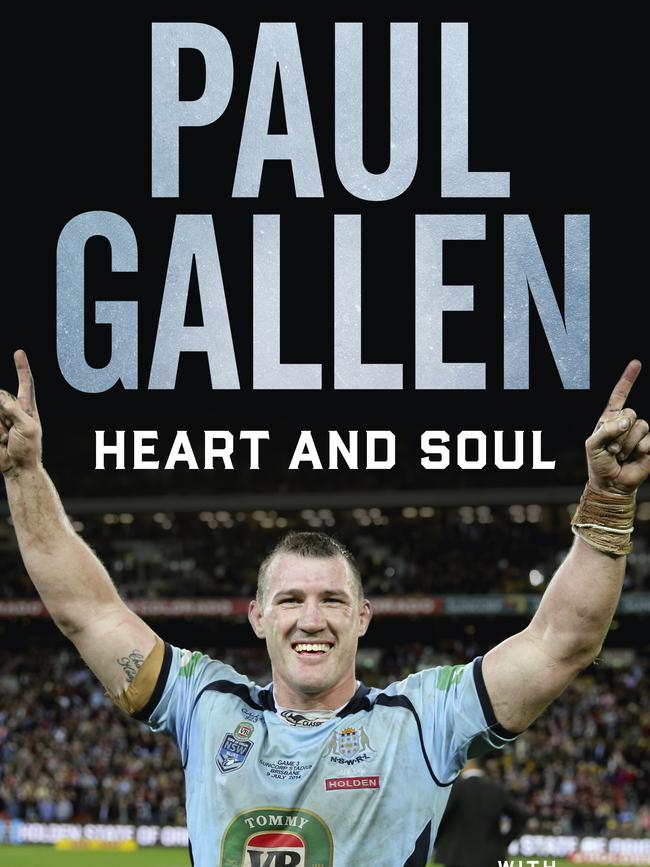
I then telephoned our club doctor, David Givney. My phone records show that I called the Doc at 11.39am. Due to legal advice, I can't reveal what was said during that phone call.
From the age of eighteen, when I arrived at Cronulla, I had been lectured by our club — and by the NRL and ASADA — on how to search for banned substances on the ASADA website.
At the beginning of every season, ASADA officials would organise a presentation and information pack for every player, explaining how best to check for illegal and banned substances.
Checking the WADA (World Anti-Doping Agency) website was never mentioned by the ASADA staff members. Not once. Yet this is an important — in fact, critical — point, which I would only discover in the coming months.
With my ASADA website query failing to deliver a positive match to the peptide I had searched for, and having spoken to our club doctor and asked questions of Trent and Dank, I felt comfortable that what I was about to consume was legal.
I trusted the combined advice from my superiors.
Trent had been our head of high performance at the Sharks for the previous seven years, which is a long time to be associated with a coaching staff member in any professional sport. He was one of the most thorough and hardworking head trainers I had ever been associated with. There's a bond that forms between a player and the club's head of high performance.
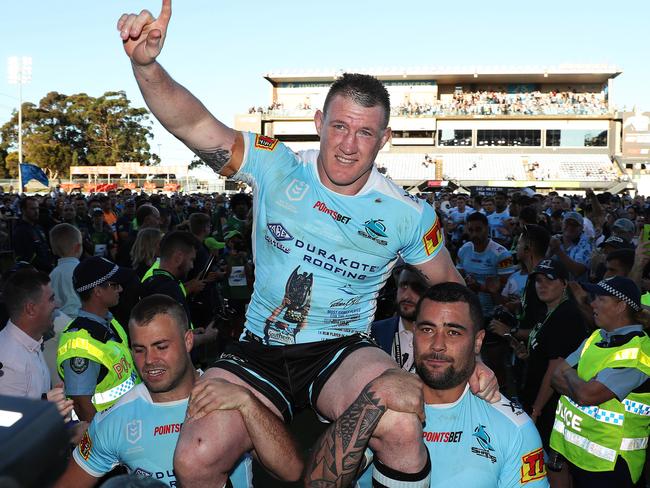
During a season, a footballer will work just as closely — if not more closely — with the head trainer as with the head coach. Each day that you go to work as a professional rugby
league player, you are constantly assessing how your body feels, which part of the body needs attention and why you may need to increase your level of conditioning or, alternatively, rest from a training session. And aside from the individual, no one at a footy club understands a player’s body better than the head conditioner.
Trent was renowned for working incredibly long hours on a shoestring budget at the Sharks, researching different training methods and always looking to improve our health, diet, strength and conditioning.
He may have been considered an authoritarian, but I knew that Trent's focus and preparation towards our training was A1. He would leave no stone unturned, so I knew that — given his diligence — it simply couldn't be feasible that he would put the players' careers, health and lives at risk.
Confident in my own checks and the faith I had in my superiors, I accepted the supplements.
This is an extract from Heart and Soul, Allen & Unwin, $34.99
Editor’s Note: We have received the following information from a lawyer representing Dr Givney. “Dr Givney became aware of the use of peptides well after the period your article speaks of when he then reported on what was going on. Mr Gallen never, at any stage, asked my client about GHRP6. Dr Givney never knew of the existence or substance of GHRP6 until much later when he reported to the Club and Coach of what was going on and instigated the investigations that followed.”
